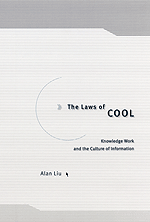Alan Liu on the production of knowledge in the age of the Wiki

The Chronicle of Higher Education published an article today about the Digital Humanities Summer Institute at the University of Victoria discussing, among other topics, a fascinating talk given by Professor Alan Liu—one of the leading theorists focusing on the intersection between digital technology and the humanities, and the author of several books on the subject including, The Laws of Cool: Knowledge Work and the Culture of Information and the forthcoming Local Transcendence: Essays on Postmodern Historicism and the Database. Writing for the Chronicle William Pannapacker takes note of Liu’s talk for its examination of the increasing use of digital information resources like Wikipedia by students, and the problem of its limitations in terms of scholarly authority. Pannapacker writes:
Since it’s clear enough that Wikipedia—and other sites based on reader-generated content—are too large and accessible to police themselves effectively, Liu argues that the responsibility for that policing should be adopted by the already existing structures of authority, including academe in particular.
I have to agree: We can’t get our students into the libraries; we hardly go there ourselves anymore, as much as we might love them. The time has just about arrived when information that is not online does not exist for most people.…
Of course, Liu’s presentation raises more questions than it answers: There are, after all, so many complications about the means by which credibility can be rated. We all know the peer-review system is not perfect.
But Liu’s vision of a more public, collaborative, and service-oriented role for professors has considerable appeal to me, and it charts some of the steps that must now be taken into this new world of online knowledge production.
Read the full article online at the Chronicle website, then navigate to the website for the University of Victoria’s Digital Humanities Institute to view the archived podcast of Liu’s talk.